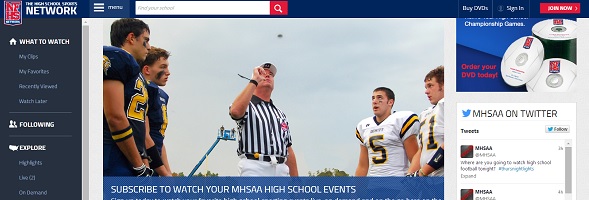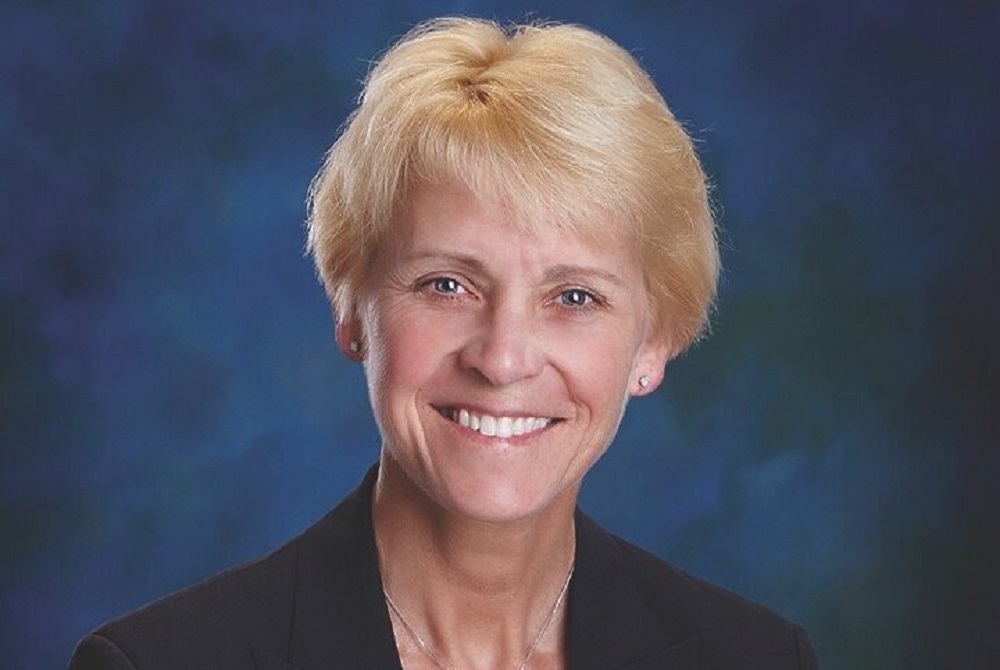
Entries Sought for Excellence Awards
January 28, 2015
By John Johnson
MHSAA communications director
MHSAA members participating in its School Broadcast Program have two opportunities to receive recognition for their efforts and learn more about the world sports broadcasting.
Last week, the formal “Call for Entries” took place for the MHSAA’s Second Annual SBP Excellence Awards. This program, in partnership with Herff Jones, allows SBP schools to submit their work in five categories – Single Camera and Multi Camera Production of athletic events, Best Use of PlayOn! Graphics/Software, Best Produced Commercials/Features and Best Student Play-by-Play Announcing. A Program of the Year Award also will be presented.
Entries will be accepted until 4 p.m. Feb. 20, with winners announced in April. Complete rules and entry information can be found on the School Broadcast Program page of the MHSAA Website.
SBP participants also have the opportunity to attend the NFHS Network’s inaugural Broadcast Academy, July 17-19 in Atlanta, Ga. The Academy is designed for student broadcasters to hear from successful sports broadcasters from major networks, develop skills through hands-on broadcast training sessions and be recognized for their accomplishments during the first annual NFHS Network Broadcast Academy Awards ceremony. Academy attendees also will attend an Atlanta Braves game and be able to share best practices and experiences with other student broadcasters from schools across the country.
The NFHS Network also will present awards to SBP schools from across the county in multiple categories, including Best Overall Program, Best Live Sports Broadcast, Best Student Broadcaster and Best Teacher of the Year. The application deadline for the awards program is Feb. 15. Click for more information about the NFHS Network Broadcast Academy.
The MHSAA also will be providing SBP participants with two more “Field Trips” during the Girls and Boys Basketball Semifinals in March, where students will get a behind-the-scenes look at broadcast operations at those events, be able to create their own content at the games and visit with broadcast professionals about careers in sports broadcasting. The field trips are run in cooperation with the Student Broadcast Foundation and Herff Jones. More information will be available soon on the School Broadcast Program page of the MHSAA Website.
This week’s live SBP-produced events on MHSAA.tv again will feature a hockey showdown, as the top-ranked teams in Division 1 and Division 3 respectively – Detroit Catholic Central and Bloomfield Hills Cranbrook-Kingswood – face off Friday (Jan. 30) at 7:15 p.m. A great nonconference boys basketball matchup in the week ahead will have Stevensville Lakeshore, the top team in the Southwestern Michigan Athletic Conference West, at Dowagiac, the second place squad in the Wolverine Conference West, on Tuesday (Feb. 3).
The School Broadcast Program gives members an opportunity to showcase excellence in their schools by creating video programming of athletic and non-athletic events with students gaining skills in announcing, camera operation, directing/producing and graphics. The program also gives schools the opportunity to raise money through advertising and viewing subscriptions.
Here’s the schedule of School Broadcast Program members planning to cover varsity competition this week for broadcast at MHSAA.tv (as of Jan. 26). The following events will have live streaming video unless otherwise indicated:
Wednesday, January 28
Wrestling – Triangular with Belding & Grand Rapids Forest Hills Northern at Comstock Park, 6 p.m.
Thursday, January 29
Boys Swimming – DeWitt at Haslett, 6 p.m.
Friday, January 30
Boys Basketball – Saginaw Arthur Hill at Mt. Pleasant, 7 p.m.
Boys Basketball – Johannesburg-Lewiston at Mancelona, 7 p.m.
Boys basketball – Coloma at Dowagiac, 7 p.m.
Ice Hockey – Detroit Catholic Central at Bloomfield Hills Cranbrook-Kingswood, 7:15 p.m.
Boys Basketball – Standish-Sterling at Pinconning, 7:30 p.m.
Monday, February 2
Girls Basketball – Hancock at Calumet, 7 p.m.
Tuesday, February 3
Boys Basketball – Elk Rapids at Mancelona, 6:30 p.m.
Boys Basketball – Saginaw Heritage at Mt. Pleasant, 7 p.m.
Boys Basketball – Okemos at Haslett, 7 p.m.
Boys Basketball – Lake Fenton at Montrose, 7 p.m.
Boys Basketball – Stevensville Lakeshore at Dowagiac, 7:15 p.m.
Also available this week is an SBP highlights package from the past week (see bottom of this screen) which includes a 2-2 ice hockey tie between Bloomfield Hills Cranbrook-Kingswood and Detroit U-D Jesuit; plus Goodrich scoring a 55-43 victory in girls basketball at Haslett in a clash of top-10 teams in Class B.
Live stats of select basketball games also are available on MHSAA.tv. Check out the MHSAA.tv website on game nights to see which schools are streaming live stats, or stop by to view stats following games on an On Demand basis. A Day Pass to view live stats is $1.95. All sporting events – live or delayed - are available on MHSAA.tv on a subscription basis for their first 72 hours online. A portion of each subscription is returned to school originating the broadcast. Video subscriptions run $9.95 for a Day Pass and $14.95 for a Month Pass. Some schools also are offering Annual Passes at a discounted rate. All sporting events become available for free On Demand viewing three days after they have been posted.
To view all of the recent School Broadcast Program productions, go to MHSAA.tv, click On Demand on the nav bar of the left side of the page, and on the Filters tab at the top of next page, click on All States and then select Michigan.
Schools interested in becoming a part of the School Broadcast Program should contact John Johnson at the MHSAA Office.

Title IX Continues to Fuel Growth of Girls and Women’s Sports, Olympic Dominance
By
Karissa Niehoff
NFHS Executive Director
September 24, 2021
To say that American female athletes dominated the recent Olympics in Tokyo would be an understatement.
Among the 66 medals earned by American female Olympians – most by any country in the history of the Games – were gold-medal performances by the U.S. basketball, volleyball, water polo and beach volleyball teams. Eighteen medals were earned by the U.S. women swimmers, female track and field athletes claimed 15 medals, and the U.S. women’s softball and soccer teams won silver and bronze medals, respectively.
In the past 30 years of the Olympic Games, the United States has dominated the women’s team sports of basketball (nine golds), soccer (four golds, one silver, one bronze) and softball (three golds, two silvers) — not to mention the untold number of medals in track and field. And this past summer, the U.S. women’s volleyball team claimed its first gold medal.
These performances by some of our nation’s most skilled female athletes never would have been possible without the passage of Title IX and the offerings of these sports through our nation’s schools. With the chance to play afforded by the landmark Title IX legislation in 1972, girls participation in several high school sports skyrocketed in the years that followed.
When the NFHS conducted its first participation survey in 1971, basketball and outdoor track and field were the primary girls sports, comprising about two-thirds of the 294,000 total. However, with the opportunity to play additional sports, girls flocked to volleyball and softball first, along with cross country and eventually soccer.
Soccer, in fact, has had the most remarkable growth. In 1971, only 700 girls were playing high school soccer. Twenty-five years later, that number had climbed to almost 210,000; and as the 50th anniversary of Title IX approaches, there are now almost 400,000 girls playing high school soccer – a staggering 56,200 percentage increase in 50 years. Soccer now ranks fourth in popularity among girls high school sports – all because of that opportunity in 1972.
There are many other success stories, however. The pre-Title IX survey in 1971 indicated that 1,719 girls were participating in cross country. With increases every year until 2015, today, there are 219,345 girls competing in high school programs and the sport ranks sixth in popularity.
Although participation numbers have leveled a bit the past 10 years, fast-pitch softball is another sport that flourished after the passage of Title IX. With fewer than 10,000 participants in 1971, the numbers quickly rose to 220,000 by 1985 and 343,000 by 2000, and softball is currently fifth among girls sports with 362,038 participants.
Since track and field and basketball were the primary sports in the early days of girls sports programs, increases in those sports have not been as dramatic; however, they remain the first and third most-popular sports, respectively, today. Volleyball, however, much like soccer, continues its upward climb.
Without a doubt, volleyball has seen the steadiest increases among girls high school sports the past 50 years. After starting with 17,952 participants in 1971, the numbers jumped to 300,810 by 1990 and 409,332 by 2010 and 452,808 by 2018. During its climb, volleyball surpassed basketball as the No. 2 girls sport.
And among the top six girls sports from 2010 to 2018 (numbers are not available the past two years due to the pandemic), volleyball has gained the most participants (43,476), followed by soccer (32,549). And all of this has occurred thanks to legislation passed in 1972 that was not fundamentally meant to address opportunities for girls to participate in high school sports.
The NFHS is leading a yearlong celebration of the 50th anniversary of Title IX, which officially occurs on June 23, 2022. “Title IX at 50 – Celebrating and Growing Opportunities” is highlighting the law’s impact by celebrating the inspirational individuals and landmark moments in the history of Title IX, and continuing to grow the educational and competitive opportunities for the future.
More information, including a Title IX Timeline, Title IX Milestones, The History and Importance of Title IX, Title IX Fact Sheet, Title IX Frequently Asked Questions and several Title IX videos, can be accessed on the NFHS Website.
Dr. Karissa L. Niehoff is beginning her fourth year as executive director of the National Federation of State High School Associations (NFHS) in Indianapolis. She is the first female to head the national leadership organization for high school athletics and performing arts activities and the sixth full-time executive director of the NFHS. She previously was executive director of the Connecticut Association of Schools-Connecticut Interscholastic Athletic Conference for seven years.

